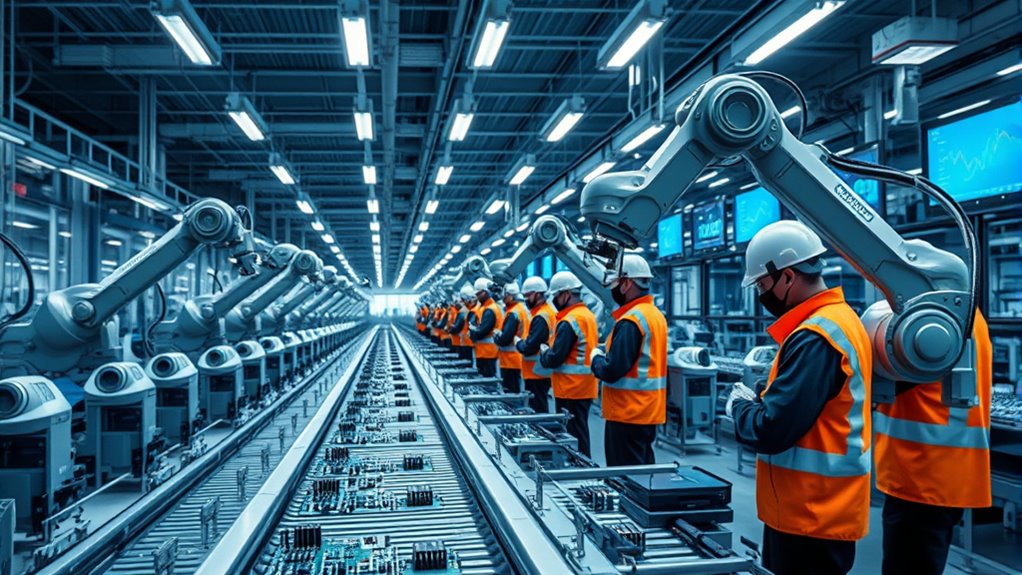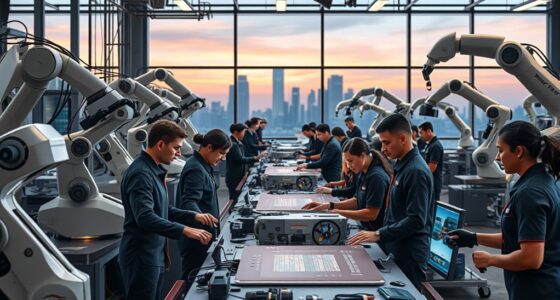Jobs in manufacturing, data entry, customer service, and accounting are already seeing automation, and more roles are set to follow. Factory workers may shift to overseeing robots, while routine office tasks get automated with AI and low-code tools. Customer inquiries and bookkeeping will become more automated, leaving less manual work. The healthcare sector will increasingly use AI for diagnostics, and software development will see more AI-assisted tools. Exploring these trends can help you understand where opportunities lie next.
Key Takeaways
- Manufacturing roles such as manual assembly and material handling are increasingly automated with robotics and automated systems.
- Routine data entry and customer service tasks are being replaced by AI-powered chatbots and workflow automation tools.
- Repetitive accounting and bookkeeping functions are transitioning to automated solutions like AI-driven financial analysis and cloud bookkeeping.
- Retail positions such as checkout clerks and inventory staff face automation through self-checkout, contactless payments, and robotic inventory management.
- Healthcare administrative tasks and diagnostic processes are adopting AI tools to improve speed, accuracy, and personalized patient care.
Top picks for "sector jobs next"
Open Amazon search results for this keyword.
As an affiliate, we earn on qualifying purchases.
Manufacturing and Assembly: The Future of Factory Jobs

Manufacturing and assembly jobs are evolving rapidly as automation continues to transform factories. You’ll notice more robots and automated systems taking on repetitive tasks like assembling components or handling materials. Manufacturers are investing heavily in automation to boost efficiency, flexibility, and quality. This shift helps address labor shortages and ensures consistent production standards. Small and medium-sized factories are adopting these technologies, once only accessible to large corporations, making automation more widespread. As a result, some roles focused on manual assembly are decreasing, but new opportunities emerge for workers skilled in operating, maintaining, and programming advanced machinery. Automation also supports reshoring efforts, strengthening domestic supply chains. The increasing integration of automated systems is expected to redefine workforce requirements across industries. Moreover, staying informed about technological advancements will be crucial for workers aiming to adapt to these industry changes. According to recent industry reports, staying updated on automation trends will be essential to adapt and thrive in this rapidly changing environment. Additionally, understanding the ethical implications of automation deployment can help companies navigate societal impacts responsibly. For example, understanding regulatory changes related to automation can ensure compliance and smooth implementation processes.
Data Entry and Customer Service: Automation in Client Interaction

Automation is transforming how businesses handle client interactions and data management. Despite automation advances, data entry jobs grew 7% last year, showing ongoing demand. Workflow automation cuts data errors by 37% and boosts accuracy by 88%, enhancing data quality. Cloud-based low-code tools let employees automate simple tasks themselves, democratizing automation. AI-powered automation enables complex workflows, shifting roles from manual input to oversight. Customer service benefits from generative AI tools, with 47% of salespeople using them, and 42% automating routine inquiries. AI chatbots and virtual assistants improve response times and consistency. Additionally, the integration of AI in Education is fostering new training opportunities for workers adapting to automation. Here’s a quick overview:
| Aspect | Impact |
|---|---|
| Data Entry | Increased demand, better accuracy |
| Customer Service | AI tools, faster responses |
| Workflow | Cost savings, efficiency |
| Workforce | Upskilling, hybrid roles |
| Market | Growing $18.45B by 2025 |
Furthermore, automation adoption is expected to accelerate as companies seek to remain competitive in a rapidly evolving technological landscape. Increased familiarity with digital tools and ongoing advancements in AI will likely further expand automation’s role across sectors. Additionally, understanding the impact on employment can help organizations prepare their workforce for upcoming changes. For example, Nissan Tuning techniques demonstrate how automation and aftermarket upgrades can revolutionize vehicle performance, highlighting how automation can extend into specialized industries. The ongoing development of automation technologies continues to reshape traditional roles and industry standards.
Financial and Accounting: The Rise of Digital Finance Tools

Automated bookkeeping solutions are transforming how you manage financial records, making processes faster and more accurate. AI-driven financial analysis tools help you uncover insights and make smarter decisions with minimal manual effort. As these digital finance tools become more prevalent, they’ll reshape roles in accounting and finance departments across industries. This shift is driven by the increasing adoption of workflow automation software that streamlines repetitive tasks and enhances overall operational efficiency. Additionally, the integration of privacy and data management practices ensures that sensitive financial information remains secure amid these technological advances. Incorporating energy monitoring features can also assist in managing the financial impact of appliance use within organizations. Understanding the importance of digital transformation in finance can help organizations stay competitive and adapt to rapidly evolving technology landscapes. Furthermore, the implementation of automated compliance tools ensures adherence to regulatory standards with minimal manual oversight. Embracing these innovative solutions can further improve content quality and topical authority, establishing your organization as a leader in digital finance.
Automated Bookkeeping Solutions
A significant shift is underway in bookkeeping and accounting, driven by the rapid adoption of digital finance tools. You’re likely using cloud accounting solutions—58% of enterprises already do—boosting efficiency and reducing manual tasks. Revenue for cloud bookkeeping companies is growing by an average of 15%, highlighting market momentum. Automation is becoming standard; 78% of finance professionals believe future methods will be fully automated. Small and medium-sized firms, comprising over 64%, rely on software to simplify bookkeeping, while 61% of small businesses leverage AI for invoicing and payroll. Technologies like AI and RPA are transforming workflows, decreasing manual entry—only 60% of invoices were manually processed in 2024. The adoption of automation technologies is accelerating across industries, reflecting a broader trend of digital transformation in finance. In short, automation is reshaping bookkeeping into a faster, more accurate, and cost-effective process. A growing number of companies are investing in automation tools, which further accelerates this transition. Additionally, the shift towards digital transformation is supported by advancements in AI and RPA, making processes more intelligent and adaptive. These developments are part of a broader movement toward digital finance, which is revolutionizing how financial data is handled and processed.
AI-Driven Financial Analysis
As digital finance tools continue to evolve, AI-driven financial analysis is transforming how businesses forecast and make decisions. You can now uncover hidden patterns and key revenue drivers faster, thanks to predictive models powered by AI. Machine learning and deep learning improve the accuracy of stock predictions, market trends, and financial outcomes by analyzing vast amounts of historical data. Real-time data integration allows you to respond swiftly to market shifts, supporting high-frequency trading and rapid decision-making. Personalized forecasts and tailored investment advice are now accessible, aligning with your unique financial goals and risk profile. Scenario analysis and stress testing help you prepare for adverse conditions, guiding smarter risk mitigation strategies. Adoption of AI in finance is growing, enabling organizations to make faster, more informed decisions with greater confidence. Additionally, integrating payment processing solutions can streamline financial operations and improve overall efficiency. Security vulnerabilities pose an ongoing challenge, making the implementation of cybersecurity measures crucial to protect sensitive financial data from emerging threats, ensuring the integrity of AI-driven systems. Furthermore, the use of digital finance tools enhances transparency and compliance, reducing the risk of fraud and regulatory penalties. Incorporating automated data analysis can further optimize decision-making processes by leveraging advanced analytics.
Retail Sector Transformation: E-commerce and Self-Service Trends

The retail sector is undergoing a significant transformation driven by the rapid rise of e-commerce and self-service technologies. You’ll notice that digitally influenced sales already surpass 60%, with projections pointing to even higher numbers in 2025. Retailers aim to automate about 70% of daily store tasks by then, boosting efficiency and reducing costs. Self-checkout systems and contactless payments are becoming standard, minimizing wait times and enhancing the shopping experience. Cashier-less stores and AI-powered solutions are also growing, optimizing inventory and customer service. Technological advancements like robotic process automation and intelligent shelves help manage stock and improve operations. This shift toward automation not only streamlines processes but also reshapes job roles, especially for checkout clerks and inventory staff, as more tasks become automated.
Healthcare Innovations: AI in Diagnostics and Patient Care

Advancements in AI are transforming healthcare by enhancing diagnostics and patient care, making medical processes faster and more accurate. You’ll see AI analyzing vast data quickly, enabling early disease detection and improving outcomes. The market’s growth signals a future where AI-driven tools become essential for healthcare providers. Vetted tools are rigorously tested and reliable, ensuring safety and effectiveness in medical applications. Additionally, the integration of medical data analysis is paving the way for more personalized medicine, tailoring treatments to individual patient profiles. As a result, local legal resources can help healthcare providers understand compliance and legal considerations related to AI implementation. This progress is supported by the development of clinical decision support systems, which assist clinicians in making evidence-based decisions.
AI revolutionizes healthcare with faster, more accurate diagnostics and improved patient outcomes.
- Feel the relief when early detection prevents serious illnesses.
- Witness the hope AI offers through personalized, precise treatment plans.
- Experience confidence as AI streamlines workflows and reduces errors.
- Trust the expanding role of AI, backed by increased public confidence and investment.
These innovations are not just changing medicine—they’re saving lives, bringing hope, and reshaping the future of healthcare delivery for everyone.
Emerging Roles in Tech: Big Data, AI, and Cybersecurity Specialists

Emerging roles in technology are reshaping the job market, with Big Data, AI, and cybersecurity specialists leading the way. As industries rely more on data and digital security, demand for these professionals skyrockets. Big Data specialists are essential in managing vast information, with the market projected to reach nearly $230 billion by 2025. AI and machine learning experts are transforming sectors with automation and new applications, fueling continuous growth. Cybersecurity specialists defend against evolving threats, making their roles increasingly critical. Here’s a quick overview:
| Role | Key Skill |
|---|---|
| Big Data Specialists | Data governance, ETL |
| AI & Machine Learning Experts | Model development, algorithms |
| Cybersecurity Specialists | Threat detection, network security |
Robotics Revolution: Impact on Manufacturing Workforce

As robotics and automation take center stage in manufacturing, they’re transforming how companies operate and how workers adapt. You’ll see automation address labor shortages, helping maintain quality and efficiency. However, repetitive jobs are increasingly at risk of displacement, pushing you to develop new skills in advanced technologies. The shift leads to a more dynamic workforce, focusing on higher-level tasks and increased productivity.
- Feel the pressure to reskill or risk falling behind
- Experience the thrill of working alongside cutting-edge machines
- Witness job roles evolve into more strategic, tech-driven positions
- Embrace the challenge of staying relevant in a rapidly changing industry
Administrative Tasks: Automation of Routine Office Functions

Have you noticed how automation is transforming routine office functions? It notably cuts manual errors by up to 90% and boosts efficiency by 40-60%. Since 94% of companies handle repetitive tasks, automation becomes a game-changer, freeing up your time for more strategic work. For HR staff, automation can reduce administrative burdens by over half, allowing a shift toward higher-value activities. Most automation projects see a return on investment within a year, making them financially attractive. Despite this, only 31% of businesses have automated at least one function, indicating plenty of room for growth. Embracing automation can standardize workflows, streamline operations, and ultimately improve productivity, making your workplace more efficient and cost-effective.
Medical Research and Data Analysis: Enhancing Healthcare Outcomes

Automation is revolutionizing medical research and data analysis, making healthcare more accurate and efficient. You now benefit from AI-powered algorithms that quickly identify patterns, improving diagnosis speed and precision. Clinical decision support systems provide real-time insights, empowering healthcare professionals to make better choices. Automated data interpretation uncovers hidden trends in vast datasets, revealing pivotal insights. Automation also enables precision medicine, tailoring treatments to individual patients for better outcomes.
Automation transforms healthcare with AI-driven insights, faster diagnoses, and personalized treatments for improved patient outcomes.
- Feel confident knowing technology reduces errors and enhances data integrity.
- Experience faster diagnoses and personalized treatments.
- Trust in systems that support critical clinical decisions.
- Witness how automation inspires innovation and collaboration in research.
Software Development and AI Innovations: New Opportunities in Tech

AI-driven development tools are transforming how you build software, making tasks faster and more efficient. As new job roles emerge, you’ll need to adapt your skills to stay ahead in this evolving landscape. However, adopting these innovations also presents challenges that require careful navigation to maximize their benefits.
AI-Driven Development Tools
As technology advances, development tools powered by artificial intelligence are transforming how software is built and maintained. AI-driven tools automate tasks like code generation, reducing errors and increasing reliability. Low-code platforms, many enhanced by AI, are making application development more accessible, with an expected 75% of projects by 2025. These tools optimize data pipelines and automate testing, speeding up workflows and improving quality. You’ll find yourself completing routine tasks faster, freeing you to focus on complex challenges. Widespread familiarity with AI tools among employees shows their growing importance. Companies are investing heavily in these innovations, boosting productivity and opening new opportunities for software development.
- Feel the thrill of faster coding and fewer errors
- Experience the power of accessible development for all
- Witness your productivity skyrocket with automation
- Embrace a future where AI liberates new creative possibilities
New Job Roles Emerge
The rapid advancements in technology are creating exciting new job opportunities within the software development field. As AI and automation evolve, roles focused on AI-powered applications, data science, and ethical AI are expanding. New positions demand skills in languages like Python, TypeScript, and frameworks that support AI development. Additionally, hybrid roles combining software engineering, AI research, and product management are emerging to handle complex innovation pipelines. These roles not only leverage automation but also shape the future of tech.
| Role Type | Focus Area |
|---|---|
| AI Software Developers | Building AI-powered applications |
| Data Scientists | Analyzing data for insights and models |
| AI Ethics Specialists | Ensuring responsible AI use |
| Machine Learning Engineers | Developing learning algorithms |
| AI Product Managers | Overseeing AI project development |
Challenges in Adoption
Adopting new software development tools and integrating automation processes present significant hurdles for teams. You face obstacles like reconfiguring workflows and upskilling staff to work effectively with AI. Legacy systems often block smooth integration, making adoption more complex. Resistance from teams wary of security risks and quality issues adds to the challenge.
Be aware of these emotional hurdles:
- Frustration over complex system upgrades and compatibility issues
- Anxiety about security vulnerabilities in AI-generated code
- Pressure to quickly learn new skills amid rapid tech changes
- Fear of falling behind competitors adopting AI faster
Despite these challenges, overcoming them can unleash new efficiencies and opportunities. Your persistence in steering these hurdles will determine your success in embracing the future of tech-driven development.
Frequently Asked Questions
How Will Automation Affect Job Quality and Employee Satisfaction?
Automation can both improve and harm your job quality and satisfaction. It eliminates mundane tasks, giving you room for more meaningful work, but it might also deskill your role, reducing engagement. If your employer invests in upskilling and uses automation to support your growth, you’ll likely feel more satisfied. However, fears of job loss or increased workload can create anxiety, impacting your overall morale and sense of job security.
What New Skills Should Workers Develop to Stay Relevant?
You should develop skills in AI, data analytics, cybersecurity, and programming to stay relevant. Focus on enhancing your emotional intelligence, leadership, and adaptability to thrive in human-centered roles. Embrace continuous learning, green technologies, and remote work skills to keep up with evolving workplace demands. By combining technical expertise with soft skills like resilience and curiosity, you’ll remain valuable and prepared for the future job landscape.
Are There Sectors Resistant to Automation Growth?
You’ll find that some sectors resist automation growth, mainly because they rely on human skills that are hard to replicate. Healthcare professionals, educators, creative industries, skilled trades, and social workers provide essential personal interaction and emotional support. These jobs require empathy, creativity, and hands-on problem-solving, making them less vulnerable to automation. While technology advances, these sectors remain crucial, emphasizing the importance of developing skills that complement human strengths.
How Does Automation Impact Small Businesses Differently?
Automation acts like a catalyst transforming small businesses, making them more agile and competitive. You’ll notice increased efficiency, cost savings, and better customer experiences. Tasks like accounting, customer support, and inventory management are streamlined, freeing you to focus on growth and strategy. With affordable AI tools becoming more accessible, you’re empowered to innovate and stay ahead in your industry, turning routine chores into opportunities for progress.
What Ethical Considerations Arise With Increased Automation?
When automation increases, you face ethical considerations around job displacement, income inequality, and societal impact. You need to balance efficiency gains with workers’ well-being, ensuring safety and fairness. It’s vital to develop regulations, invest in retraining programs, and promote social responsibility. By doing so, you help manage the risks of automation, support affected workers, and foster a more ethical approach to integrating new technologies in the workplace.
Conclusion
So, as automation takes over more jobs, you might find yourself wondering who’s left to do the real work. Ironically, while some roles vanish, new opportunities emerge in tech and AI. The future’s not just about machines replacing humans, but about us partnering with them—if we can keep up. So, get ready to adapt, because even in a world of robots, your skills might just be the last thing standing.









